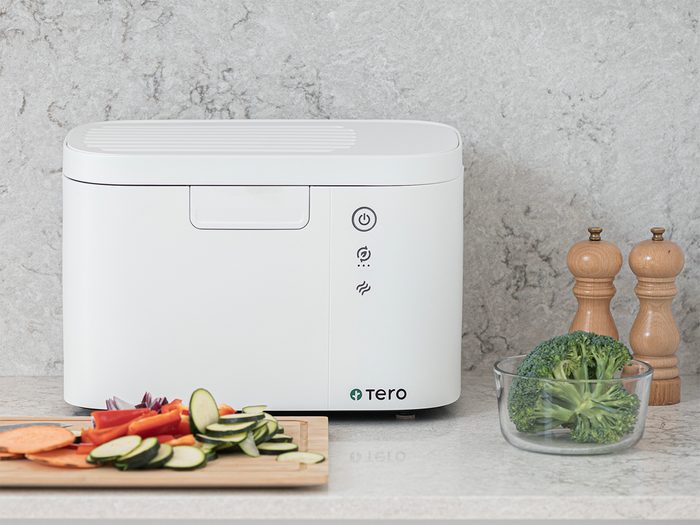Are High-Tech At-Home Composters Actually Beneficial?

Innovative devices promise to make composting mess- and odour-free, but are they worth the price?
I hide my compost bin in my freezer. I banish it to that frozen tundra—crowded with pizzas, microwave dinners and freezer-burned chicken—to keep food scraps out of my garbage and avoid the nasty smells and fruit flies that can accompany organic waste. I thought this was next-level at-home composting, but then I tried Tero.
Designed by Canadian entrepreneurs Elizabeth Coulombe and Valérie Laliberté, Tero is an award-winning countertop food recycler. The device is similar to a composter but instead of facilitating decomposition, it dehydrates and grinds vegetable peels and dinner leftovers into ready-to-use fertilizer overnight.
In 2019, Canadians sent more than 4.8 million tonnes of organic waste for processing, slightly more than 37 times the weight of the CN Tower. In fact, Canadian households produce more food waste per capita (79 kilograms) than our American neighbours (59). And with everyone spending more time at home during the pandemic, levels have increased.
Composting is an essential way to reduce the amount of waste going into landfills, which generate nearly a quarter of Canada’s methane emissions, a greenhouse gas driving the climate crisis. I’m one of the 90 percent of Canadians who has access to curbside or drop-off organics management programs. Composting, however, does not appear to be a popular option among all Canadians. A Tero survey found that only 45 percent of respondents compost at all, citing concerns like bugs, odours and a general lack of knowledge about the process.
(Related: How to Freeze Fresh Foods to Prevent Waste)
Beyond making food waste useful again, at-home composters can offer home gardeners and plant parents a natural alternative to chemical fertilizers, which pollute lakes and rivers. For me, at-home composting is great because it feels like an active way to reduce my ecological footprint amid a climate catastrophe that often feels overwhelming. With British Columbia experiencing wildfires, atmospheric rivers, landslides and more, Julia Payson, executive director of the Canadian Mental Health Association in Vernon, B.C., has seen a rise in the stress people experience around climate change, a phenomenon known as “eco-anxiety.” And while individual actions aren’t enough to curb eco-anxiety—as Payson notes, climate change is not an individual problem—engaging in at-home composting or going plastic-free “are things that people have within the realm of their control,” she says. “They will often use them as first steps.”
Like many home-based hobbies, gardening and composting saw a boost in popularity during the pandemic. After their 2019 Kickstarter campaign raised more than $1.75 million and their prototype won, Coulombe and Laliberté capitalized off this rising interest and launched Tero in September 2021.
“You don’t have to live with all the bad things with the normal compost,” Coulombe told me, explaining why it was important for them to develop a product that eliminates smells and is attractive and easy to use.
After using Tero for a few months, I can confirm that this device makes composting as simple as pressing a button. In a matter of hours (typically three to eight), Tero efficiently, albeit somewhat noisily, turned banana peels, coffee grounds and discarded vegetables into about a cup of dry, odour-free, soil-like grounds full of organic nutrients. I then added the mixture to my many, many houseplants. And they seemed to like it.
At-home composters that turn waste into garden-ready fertilizer, such as outdoor composters or work compost bins, vary in design and cost. But starting at $595, Tero’s price is steep. While it worked well and made me more conscious about the harmful impact of chemical fertilizers and what I put into my green bin, I plan to stick with my freezer bin and municipal program and purchasing organic fertilizer. This way, I can still keep my food waste out of the trash, and though it may not be homemade, my plants will continue to eat organic.




